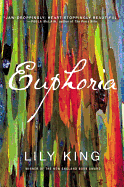
Lily King (Father of the Rain) renders three young anthropologists in 1930s' New Guinea with nuance, tenderness and charming ambiguity in Euphoria. King draws on the life of Margaret Mead and her relationships with her second and third husbands (Reo Fortune and Gregory Bateson, respectively), but the novel is only loosely based on their lives and work.
Nell Stone is an American, and has recently written a book that is receiving much attention for its controversial subject matter: the sex lives of children in the Solomon Islands. She is an up-and-coming young anthropologist being talked about around the world; when we meet her, she is just emerging from a year and a half in the field in New Guinea, alongside her husband, Fen. Fen is Australian, overbearing and decidedly threatened by Nell's success, as fame and glory as an anthropologist have so far eluded him.
When Nell and Fen come out of the field, at a party they meet fellow anthropologist Andrew Bankson. He is fresh off a failed suicide attempt, haunted by the deaths of his two brothers and unable to find himself in either his native England or the tribal communities he studies. Bankson is lonely and attracted to the couple, and suggests that he establish them with unstudied "natives" nearby his own fieldwork; he wants to keep them as his friends and neighbors.
The three form an unlikely triangle of mixed alliances. Nell and Fen, for all their disharmony, share a history and an intimacy the loner Bankson can't pierce. But Nell and Bankson achieve a singular connection of the minds: they inspire each other, each stimulating the other's best work. With Fen's sensitivity over and resentment of Nell's talents, this is a dangerous but intoxicating symbiosis, a cerebral union that is sensual and nearly sexual. Bankson is, in fact, rather in love with both Nell and Fen. The two men establish their own bonds as well, when Fen nurses Bankson through a malarial fever. It is a love triangle, but also an intellectual one, and shadows the perceptions of each anthropologist about the tribes they live amongst. They already have very different approaches: Nell has loved, ever since she was a small child, exploring other worlds so that she can come back and tell her family, friends and now colleagues about her adventures; for her, the joy is in the description and the homecoming, but she also has a knack for integrating herself into a new culture. Fen, it seems, would rather become a tribesman than study or write about the tribes. Bankson struggles to participate, but is more inclined to observation--his background is in the natural sciences. As he writes, "I was raised on Science as other people are raised on God, or gods, or the crocodile."
Lily King makes an interesting decision in choosing Bankson as her narrator, as he is the most isolated of the three, spending much of his energy in observing not only the tribal peoples he is meant to study, but also Nell and Fen. That the story of these three characters is told from the perspective of his outsider status means that the reader, too, is forever peeking in and around corners, hoping for more information. Nell's voice is heard through journal entries eventually sent to Bankson by another old friend and possible love interest of Nell's, but she remains tantalizingly difficult to access. The tension of this desire to know Nell better is central to Euphoria, for Bankson and for the reader.
King raises broader questions as well, as each anthropologist's individual approach to his or her work is troubling in its own way. The tribal communities of the fictional Kiona, Mumbanyo, and Tam peoples invite consideration about the fields and methods of anthropology and ethnology. The Tam women, who do the trading and the artistry in their community, inspire Nell's growing ideas about traditional gender roles, a stance that (predictably) does not sit well with the irritable Fen. Margaret Mead is known not only for her writings and work in anthropology, but also as a feminist thinker; in King's hands, the Tam culture inspires the beginning of Nell's own feminist development. As Bankson gravitates toward Nell's empathetic and involved relationship with the Tam, Fen is planning a serious cultural crime, which will precipitate the final denouement. (The life stories of Nell, Fen and Bankson are quite different from their historical counterparts Mead, Fortune and Bateson, so there are no spoilers for readers familiar with that history.)
Euphoria is a masterpiece of dreamy, lyrical, sensuous writing and evocation of a sometimes frighteningly exotic New Guinea. Readers can expect to be enchanted by the setting, inspired by the free-spirited Nell, challenged by the question of respectful participant observation, angered by certain of the characters' actions and teased by the sexual tension. As a bonus, the beautiful cover of Euphoria features the striking rainbow gum tree that figures in the plot of this remarkable novel. --Julia Jenkins

